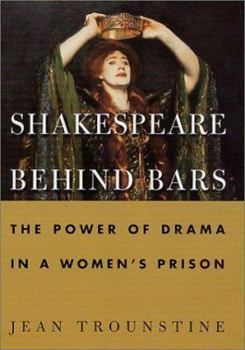Shakespeare Behind Bars: The Power of Drama In A Women's Prison
Select Format
Select Condition 
Book Overview
A deeply stirring account of one woman's experience teaching drama to women in prison. "I began to understand that female prisoners are not "damaged goods" and to recognize that most of these women had toughed it out in a society that favors others-- by gender, class, or race. They are Desdemonas suffering because of jealous men, Lady Macbeths craving the power of their spouses, Portias disguised as men in order to get ahead, and Shylocks who, being betrayed, take the law into their own hands. So writes Jean Trounstine in "Shakespeare Behind Bars. In this gripping account, Trounstine who spent ten years teaching at Framingham Women's Prison in Massachusetts, focuses on six inmates who, each in her own way, discover in the power of great drama a way to transcend the painful constraints of incarceration. We meet: * Dolly, a fiftyish grandmother who brings her knitting to classes and starts a battered-women's group in prison*Bertie, a Jamaican beauty estranged from her homeland, torn with guilt, and shunned for her crime* Kit, a tough, wisecracking con who stirs up trouble whenever she can-- until she's threatened with losing her kids* Rose, an outsider in the prison community who lives with HIV and eventually gains acceptance through drama* Rhonda, a college-educated leader whose life falls apart when her father dies and who struggles in prison to reestablish her roots* Mamie, a nurse in the free world, now the prison gardener who
Format:Hardcover
Language:English
ISBN:0312246609
ISBN13:9780312246600
Release Date:February 2001
Publisher:St. Martin's Press
Length:208 Pages
Weight:0.80 lbs.
Dimensions:0.9" x 5.8" x 8.6"
Customer Reviews
2 ratings
Moving story of the power of drama and connection
Published by Thriftbooks.com User , 23 years ago
I found this book quite moving. Rather than make this book about her own experience, the author gives the story to the women, several prisoners in Framingham Women's Prison, as she brings us into their lives. There is a stark contrast between the world of the prison and the world the women create in their literature and drama classes; one is harsh and rigid, full of "no's," while the other is life-affirming and respectful. Trounstine lets us into both those worlds in a way that is both absorbing and compelling. I came to care about all of them, to root for their successes and care about their setbacks. And I feel both sad and angry that the programs described in the book are no longer available in the name of being "tough on crime."
Lives enlarged by by art
Published by Thriftbooks.com User , 23 years ago
In 1988 drama professor Jean Trounstine received tentative permission to teach acting and rehearse a play with a volunteer group of inmates (serving time for felonies) at the Framingham Women's Prison, the highest-security women's prison in Massachusetts. She chose "The Merchant of Venice" (later on, "Lysistrata," "A Doll's House," and "Arsenic and Old Lace") for its potential to challenge and instruct - and because of her hunch that the women who participated in her classes might benefit immeasurably from art and the intense experience of learning to make theater - and actually doing it, as a team. The experience was much larger and emotionally affecting for all involved than she could have predicted: both she and her six participants were transformed by this ambitious, consciousness-raising and, ultimately, healing endeavor.Trounstine describes the project from its beginnings: it's a class some sign up for to alleviate crushing boredom - or because it's an alternative they prefer to aerobics class or volleyball. Trounstine introduces the (future) cast members: Dolly, Bertie, Kit, Rose, Rhonda, and Mamie, each in her own chapter. There's not a lot about their lives before incarceration (prison authorities frown on Trounstine's knowing any histories), and much more about who they are - and who they become - in acting class. The women learn the art of improvisation: initially skeptical, but soon with real commitment. They literally expand their consciousnesses via these exercises; they erxperience the thrill of a true group effort, and then their view of what is possible. It's a joy to watch - and to read about. The vicissitudes of prison life are center stage, as are and the ups and downs of the women's personal relationships within and outside of the class. Trounstine is not naïve in her respect for, and sensitivity to, her students. She is the best kind of teacher. Later, she suggests reading material and is frustrated by prison rules that are constant roadblocks, she feels, to inmate welfare. Some of her students have serious chronic health problems. She is often moved to tears by what she hears and seesTrounstine's reporting method includes lengthy verbatim conversations. Readers who enjoy dialogue will not be disappointed: the voices are here, clear as day. In addition Trounstine is generous to a fault in the sharing of her impressions and thoughts along the way. The story is moving and important and a convincing plea for the ability of art and education to transform lives. Not surprisingly, this book and the story it tells make a convincing case for significant changes to American women's prisons.






